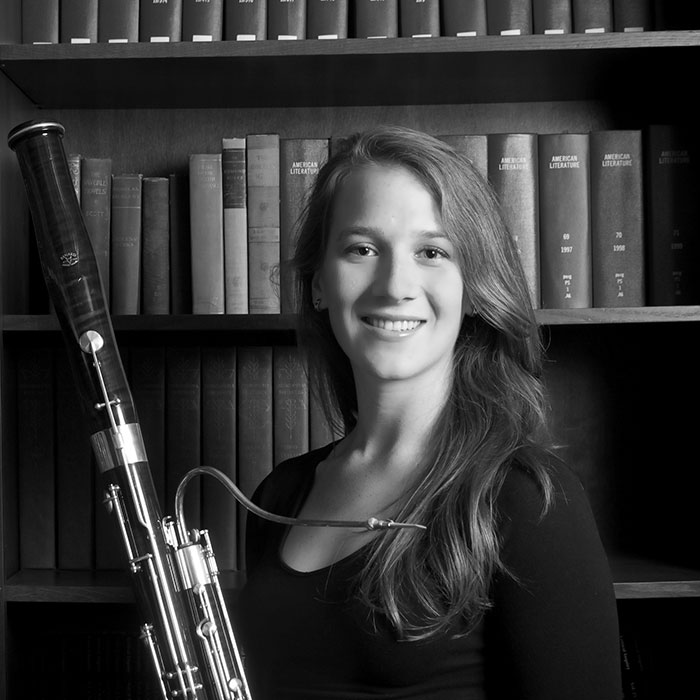Alumni Spotlights – Elizabeth Massey
Elizabeth Massey, (she/her)
(MM ’15, bassoon/musicology)
Teacher, Musicologist, Bassoonist
 Elizabeth Massey is a musicologist and Assistant Clinical Professor at the University of Maryland, College Park, where she teaches and supervises undergraduate music history research as part of the First-Year Innovation & Research Experience (FIRE) program. Massey is highly invested in pedagogy and the scholarship of teaching and learning and is an active member in the Pedagogy Study Group of the American Musicological Society. Her musicological research focuses on performance traditions, social function, and reception history. Massey received her Ph.D. from the University of Maryland and her MM in Musicology and MM in Bassoon Performance from Peabody.
Elizabeth Massey is a musicologist and Assistant Clinical Professor at the University of Maryland, College Park, where she teaches and supervises undergraduate music history research as part of the First-Year Innovation & Research Experience (FIRE) program. Massey is highly invested in pedagogy and the scholarship of teaching and learning and is an active member in the Pedagogy Study Group of the American Musicological Society. Her musicological research focuses on performance traditions, social function, and reception history. Massey received her Ph.D. from the University of Maryland and her MM in Musicology and MM in Bassoon Performance from Peabody.
Tell us about your journey to your current career path. What were the pivotal moments? What surprised you?
When I started being serious about music studies, I never imagined I would be a musicologist; I did not even know the field existed. I realized I would enjoy such a career as an undergraduate when my history professors encouraged me to write research papers using musical evidence. My bassoon instructor encouraged my interest, and I went to Peabody because I could get two master’s degrees: one in bassoon and one in musicology. Even though I chose musicology, I still gig as a bassoonist, and I think the intensive performance degree is valuable perspective to have when teaching music history.
What opportunities did you take advantage of in school that helped you to build helpful skills and experiences?
My work as a music history TA helped me to realize that I enjoyed teaching music history, which is partly why I decided to continue in that field and get the Ph.D. My TA positions especially while in my PhD program gave me amazing opportunities to gain experience and further fueled my interest in pedagogy. I was intentionally reflective about my teaching and intentionally sought teacher training opportunities. That experience led me to my first work as an instructor of record.
How has your network and/or community impacted your professional journey?
Having a network of support is so important! The communities I was part of at each of my institutions are those that have allowed me to get performance gigs, know about teaching job opportunities, and have mentorship once in those positions. It’s important to treat everyone—students and teachers alike—as colleagues; doing so helps create a network and makes that network a positive community based on respect. It’s important to have that in the moment and in the future!
Who has been an influential mentor for you and why?
One of my biggest mentors has been my undergraduate bassoon professor, Anna Claire Ballard-Ayoub, who is also a Peabody alumna. She encouraged me to notice what my skills were and consider how to create a path for myself based on those skills as well as my love for and desire to be part of music. I learned from her how to inform my playing with music history knowledge and she helped me see music history as a potential career. She pushed me to make meaningful goals and then pursue them with dedication and excellence.
Have your goals and priorities changed over time? If so, how?
When first starting graduate school, there is a lot of excitement and healthy enthusiasm. In some cases, that can turn into unhealthy competition. After reading William Cheng’s Just Vibrations in a music history pedagogy class as a PhD student, I became inspired by their idea of “what if the purpose of sounding good isn’t to do well, but to do good?” Instead of comparing myself to others, I’m now focused on doing good: how can I serve others (my students)? How can I contribute positively to music culture? How can I use my skills to enact change for good?